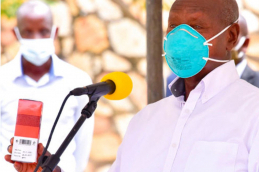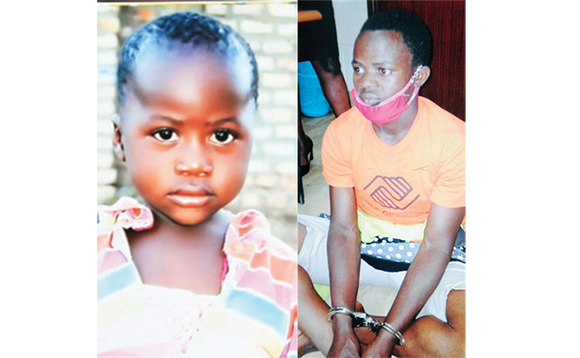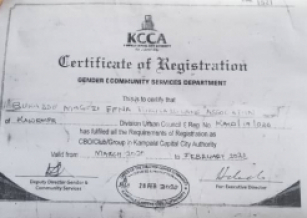
A profile photo of some of the members of this famous African Christian choir
The name Eschatos Bride should ring a bell for every Christian music enthusiast, especially those above the age of 30. For years, the evangelical music group has stood out for their unique harmonious music, often unaccompanied, that draws inspiration from classic choral compositions.
Eschatos’ pioneering style of performing hymns, psalms and anthems greatly inspired many other Christian music outfits in the seventies and eighties at the peak of its popularity.
The man behind all this is DR ABBEY KIBALAMA, a pillar in choral music whose influence cuts across various Christian denominations. He told David Lumu about his and Eschatos’ 48-year journey from a three-man outfit to a legendary choir that has stood the test of time with more than 100 albums.
Dr Kibalama embodies everything Eschatos is all about. Every Friday, he climbs the daunting Namirembe hill to meet with a congregation of born-again Christians. He also speaks with a firm voice and for a person who is almost six feet tall, it is hard to imagine Kibalama is 86 years old.
The retired teacher and itinerant evangelist is the founder and director of the Eschatos, a choir he founded in 1971. So, before there was the famous Golden Gate choir, Calvary Cross choir or even the Good Samaritan choir, the Eschatos were already established.
FAMILY INFLUENCE
Born in 1933 in Busonko village, Wakiso, Kibalama is one of three children born to Eriasafu and Beza Kibalama.
“My mother Beza was a Mothers’ Union worker and stayed at home most of the time but daddy was a carpenter and also served at the local village council,” he says. “They were such an influence in my life and laid a good foundation for me to identify my talent. Daddy was a church lay reader (Omubulizi) and introduced me to the consonants and eventually a reading lesson. By the age of five, I could read a Luganda bible. I grew up with a love for the church.”
Kibalama started out at Kikandwa sub-grade mission school and later Masuulita primary school in 1944. In 1950, he joined Bishop School Mukono for secondary education.
“Here, everyone had to participate in singing, either in the main school choir which was also chapel choir or the house choir. I was in yellow house and a music prefect,” he recalls. “However, my career goal was to become a teacher.”
From Bishop School, he crossed to Bishop Tucker Theological College (now Uganda Christian University), where he graduated as a teacher. In 1954, he was posted to Nsangi primary school, where he taught geography and arithmetic. While there, he teamed up with fellow music-mad teachers Joseph Mulindwa and Elliot Kabuye ( RIP) to form The Independent Larks.
SPIRITUAL INFLUENCE
Kibalama’s career turned around in 1957 when he got saved.
“The day I accepted Christ as my saviour brought about several changes in my programs,” he says. “They involved a change of direction in the use of the talents in me that I had identified. I asked God to forgive my wrongdoing and to use me wherever He was going to take me.”
And one of those journeys was on January 20, 1962 when Kibalama wedded Florence Ndagire, a fellow teacher with whom they went on to have six children.
The teaching profession involved a lot of transfers and this meant the family kept changing to new places and, therefore, new experiences.
“Wherever I went, I would attend the local fellowships of the born-agains (balokole) for nurturing. I taught music tonic solfas, conducted school choirs, participated in school choir competitions, joined church choirs and was able to appreciate the melodies and words of hymns,” he says.
In 1965, while a tutor at Namutamba PTC, Kibalama was joined by three friends to found Jordan Crossers. In 1967, he and his colleagues in Jordan Crossers were transferred to Lady Irene Teachers’ College, Ndejje as tutors, but 1971 found him in Buloba primary teachers college, marking another unique turning point.
While here, the choir grew bigger and they became seven members, amongst them a young Jimmy Katumba, who was a student at the college. Katumba would later become a national star after forming The Ebonies in 1976.
Kibalama recalls the dilemma they faced at the start: “When we decided to make a recording at the [UTV] studios, we were advised to change the name from Jordan Crossers to avoid the risk of mistaking us as having a link with Israel, a country [then president Idi] Amin hated. This was about the beginning of political turmoil in the country.”
As a result, Kibalama and company gave the group a new name and Eschatos Bride was born.
“A few days earlier, we had attended a lecture in theology at Makerere University where the keynote speaker defined eschatology,” he says. “So, the name was now referring to the bride of the [end times] or the church that Jesus will find when He returns; Jesus Christ as the bridegroom, and the church as the bride.”
At the start, Eschatos Bride had nothing apart from their voices.
“All we did was perform Christian hymns a cappella. It was unique because we blended hymns with traditional elements,” he says.
The Eschatos became an instant success and much as their roots lay in the Anglican Church, their popularity crossed over other denominations with the exposure of their music played on Radio Uganda. At the time, the Balokole movement was enjoying popularity and many of Eschatos followers found the traditional Anglican setting somehow conservative.
“We performed in virtually every major church in Uganda. Our music was awakening.”
Pastor Simeon Kayiwa of Namirembe Christian Fellowship, a long-time friend of Kibalama, describes him as a pioneering inspiration.
“I’m personally most thankful for Dr Kibalama’s influence and impact on my choir [Calvary Cross choir],” he says. “I represent many out there whose lives have been touched by the Eschatos ministry. We, together with many other singing organizations, regard [Kibalama] as a father.”
In 1975, Kibalama retired from civil service to join Jinja-based Olivetti Company Uganda as manager. The tense political atmosphere in the country, which lasted more than a decade, greatly limited his interaction with colleagues in Kampala and to improvise, he started the Eschatos Bride, Jinja wing.
“It is here that we moved out to churches for outreach missions. The approach of that time was unique. We had an organised session of talking, singing, reading the bible and later an altar call. We would sing our original compositions, the psalms and those translated.

There is the Eschatos Choir in practice
In 1982, Kibalama attended Haggai Institute in Singapore and got a certificate in leadership skills, in connection with evangelism. The following year, he attended the international conference for itinerant evangelists courtesy of the Billy Graham Evangelistic Association.
In 1994, the Eschatos got an invitation by then Kenyan president Daniel arap Moi, to minister.
“We sang for the cabinet too and performed at one of Kenya’s biggest schools although I don’t remember the name,” he recalls. “It gave us a lot of encouragement to continue on the mission.”
In December 2009, Kibalama received an honorary doctorate from the United Graduate College, USA for his outstanding work in evangelism through music.
THE ESCHATOS TODAY
In 2002, the Kibalamas left Jinja to settle at their retirement home at Kalambi, Buloba, Wakiso district. The home also acts as the base for Eschatos Soundcare studio popularly known as GOSENI.
Today, Eschatos is comprised of about 25 members that travel less but have more of audio recording after a series of regular practices on Saturdays. Current members Margaret Semakula, Misaeri Kimbugwe and Molly Lwanga Zziwa are also some of the pioneers.
Kibalama insists there is more to Eschatos than the music.
“We set out to preach the message of salvation through song, harvesting souls for Christ,” he says. “We are actually an evangelic establishment and combine ideas in a choir setting in order to present the message in a simple way and in a language people understand.”
He admits Eschatos Bride emphasizes the importance of music or its unique role when giving a sermon or a teaching to a congregation.
“I have researched on this unique role over time and I can testify to the hidden power of music in sermons,” he says. “I believe the message in a song should be clearest in one’s language. If it is not well phrased, the message will be distorted and the word will contain a different meaning depending on how it is sung.”
Indeed, the message in Eschatos’ music is always clear and is on a particular theme.
“The choice of the theme comes as a leading of the Spirit; some are special requests from our esteemed listeners,” Kibalama says.
Meanwhile, some former members are spread out in different workplaces of the diaspora. Sarah Kibalama, his daughter, continues to sing and conducts a London-based church choir of Ugandans.
THE CHALLENGES
Kibalama admits the world is changing and responsibilities to the members are also on the increase.
“Some members move on when they get married, some get upcountry job assignments and others go abroad,” he says. “The group transport costs too are high. However, God still provides through the support of friends of the choir.”
Looking back, Kibalama notes a number of accomplishments.
“We have a record 106 albums on CDs and casettes, arranged under different themes. We have albums in English and also in several other local languages including Luganda, Lusoga, Kiswahili, Runyankore, Luo and Rutooro,” he says. “We have also directly or indirectly mentored many gospel choirs. And, by the way, we also created the Eschatos Bride hymnbook.”
THE FUTURE
Patrick Bakka Male, the head teacher of King’s College Budo, is a long-time fan of the Eschatos.
“Eschatos choir has a distinct music quality, tone and inspiration that cannot be mistaken for any other choir,” he says. “To preach the message of salvation through song, Dr Kibalama brings out experiences of song writing, worshiping, and preaching using a blend of music and words. His emphasis is on accuracy of the music, the pronunciation, meaning and opportunity for one to make a personal commitment to Christ.”
Dr Kibalama admits Eschatos is planning a special 50th anniversary album and show. If all goes according to plan, that would be a great milestone in Ugandan music for any outfit to last 50 odd years.
dlumu@observer.ug
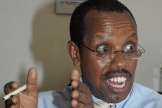
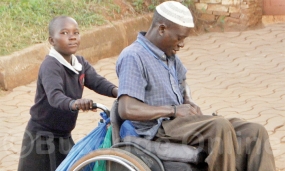


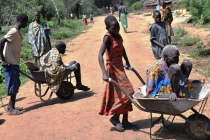

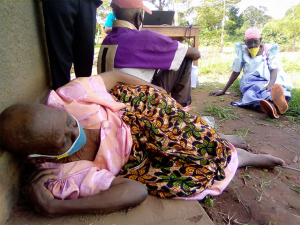
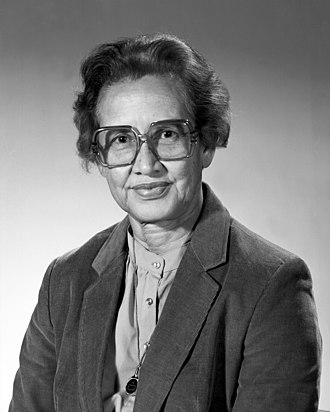 M/s Creola Katherine Johnson Coleman
M/s Creola Katherine Johnson Coleman
